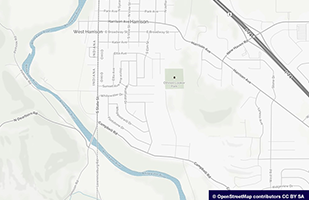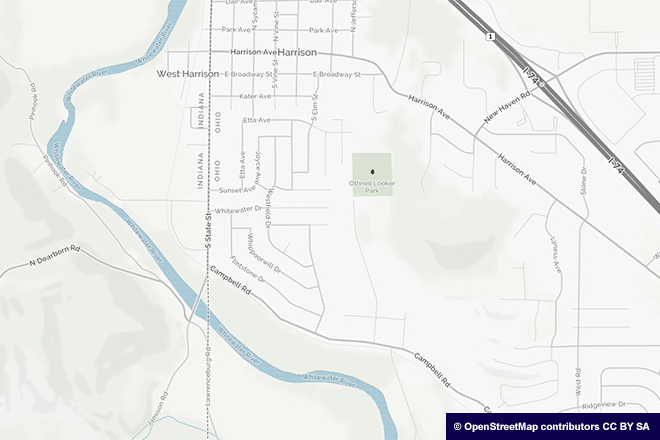Death-Row Inmate Contests Ohio’s Jurisdiction in His Murder Trial

If Harrison girl was killed in Indiana, Jeffrey Wogenstahl argues Ohio had no authority to try him for her murder.

If Harrison girl was killed in Indiana, Jeffrey Wogenstahl argues Ohio had no authority to try him for her murder.
A man on death row for the 1991 murder of a child from Harrison claims the state didn’t have the right to prosecute him in Ohio because the child may have been murdered in Indiana.
The Ohio Supreme Court reopened Jeffrey A. Wogenstahl’s direct appeal in this death-penalty case to consider Wogenstahl’s assertion that Ohio didn’t have jurisdiction to try him for murder. The Supreme Court will hear his case on April 4 during a three-day oral argument session. On the last day of the session, April 6, the justices will travel to Morgan County for the Court’s semiannual Off-Site Court program.
Girl Taken in Ohio, Found Dead in Indiana
Wogenstahl met Peggy Garrett in October 1991 and got to know her five children, including 10-year-old Amber. Garrett and her children lived in Harrison, a southwestern Ohio city on the border with Indiana. While Amber’s mother was out on a November night, Wogenstahl tricked Garrett’s oldest son, who was babysitting his three youngest siblings, into leaving the apartment by saying that his mother was in trouble at another friend’s nearby house. Wogenstahl dropped off Garrett’s son at the house, returned to Garrett’s apartment, and abducted Amber.
A clerk working at a State Street convenience store in Harrison said she noticed Wogenstahl and a girl in his car about 3 a.m. She saw Wogenstahl again, but alone, close to 4 a.m. at the car wash across the street and then in the store. Other witnesses testified that they observed Wogenstahl and his car on the side of Jamison Road in Indiana, about four miles from Harrison. Indiana State Police found Amber’s body near that location.
The Hamilton County trial court sentenced Wogenstahl to death in early 1993 after a jury found him guilty of aggravated murder, kidnapping, and aggravated burglary. To date, Wogenstahl has lost all his appeals in state and federal court.
Parties Dispute State’s Jurisdiction Law
According to Wogenstahl, the state introduced testimony and a map at trial indicating his route after kidnapping Amber and presented a theory that he killed Amber in Indiana. Wogenstahl also points to a 2004 Ohio Supreme Court decision (State v. Yarbrough) involving the kidnapping of two college students in Steubenville who were murdered in Pennsylvania. Based on state law at the time, the Court ruled that Ohio had no jurisdiction over the murders because they were committed in Pennsylvania, though the Court upheld the other convictions in the case, including kidnapping. Though the General Assembly has since made changes to the statute, Wogenstahl indicates the earlier version applies to his 1990s case.
The Hamilton County prosecutor contends that, unlike the facts in Yarbrough, the location of Amber’s murder was never pinpointed even though her body was found in Indiana. The statute provides that when it’s unclear in which jurisdiction a crime occurs, the crime is presumed to have taken place in Ohio, the prosecutor notes. Blood evidence found on Wogenstahl’s car in Ohio also gives the state jurisdiction under the statute, the prosecutor argues. Given the blood evidence and the uncertainty about the murder site, the prosecutor reasons that the law gave Hamilton County jurisdiction to consider the murder charge.
Three Days Scheduled for Oral Arguments
The Court will hear arguments in in State v. Wogenstahl and nine other cases during three days, from April 4 to April 6. The Court’s session will begin at 9 a.m. at the Thomas J. Moyer Ohio Judicial Center in Columbus on Tuesday and Wednesday and at 9 a.m. at Morgan High School in McConnelsville on Thursday. All arguments will be streamed live online at sc.ohio.gov and broadcast live on The Ohio Channel.
Case Previews Available
Along with the brief descriptions below, the Office of Public Information today released previews of the central arguments in the cases.
Tuesday, April 4
The Court will consider two cases before Wogenstahl:
In Gyugo v. Franklin Cty. Bd. of Dev. Disabilities, a man with a sealed criminal conviction got a job in Columbus working with developmentally disabled adults after responding on the job application that he hadn’t been convicted of a felony or other offenses. During his career, he also stated on required paperwork that he had no convictions, even sealed ones. The employer fired him after 18 years when a background check revealed his sealed record. The former employee argues that the questions on the forms were illegal and he didn’t have to disclose his conviction because sealed convictions are considered not to have occurred.
In Wood County Bar Association v. Searfoss, the Board of Professional Conduct is recommending that a Wood County attorney be suspended from the practice of law for two years with one year stayed for charging an excessive fee and failing to provide competent representation. The board also notes that the attorney and his lawyer both failed to attend a scheduled hearing. The attorney claims he is being unfairly punished for missing the hearing.
Wednesday, April 5
For a second time the Court is considering whether to indefinitely suspend a Cuyahoga County attorney based on allegations made by the law firm where he worked and his nursing-home clients. The Board of Professional Conduct concluded that the attorney billed for work he didn’t perform and overbilled clients. In Disciplinary Counsel v. Smith, the attorney argues he was unable to adequately defend himself because the firm and clients blocked access to critical records.
At issue in Terraza 8, L.L.C. v. Franklin Cty. Bd. of Revision is a disagreement about what value should be used when calculating the property taxes for a Hilliard fitness facility. The county auditor valued the property at $4.85 million, while the school board contends that a $15.4 million sale price in 2015 is the proper worth. The property owner supports a $7 million appraisal because it takes into consideration a lease on the property and other accounting criteria.
A Mahoning County woman joined an insurance company’s program to start a new agency. The agent and the company signed multiple agreements over the course of a few years as the program rules changed. The agent fell behind on sales goals and she accused the company of hampering her efforts. She sued the company and was awarded $42.8 million by a jury, but the award has been reduced by subsequent court rulings. In Nationwide v. Lucarell, the Court will consider if the woman proved her case against the company and if a jury can award punitive damages in a contract dispute.
A Cleveland attorney in Cleveland Metro. Bar Assn. v. Heben faces a six-month actual suspension for disclosing confidential client information in an affidavit he filed in court. He objects to the Board of Professional Conduct’s recommendation, asserting that he thought he was required by a local court rule to provide detailed information in the document, he received faulty guidance on his ethical obligations, and he acted not vengefully but in good faith. He asks the Court for a sanction with no actual suspension time.
Thursday, April 6 in Morgan County
In Johnson v. Montgomery, a dancer at a Dayton strip club left her job intoxicated and crashed into a car on Interstate 70 causing extensive and severe injuries to the female passenger. A jury awarded the injured woman $2.85 million, finding that the stripper and the club were equally negligent, but the verdict was overturned on appeal. While the club prevailed by arguing that a state law protects it from legal responsibility when an intoxicated person causes harm, the injured woman counters that the law doesn’t apply when the person is a worker at an establishment that makes money from encouraging customers to buy drinks for the strippers.
A highway patrol trooper pulled over a car for speeding and discovered the woman driving had a suspended license. The trooper placed the woman in the back of his cruiser and learned that she had an outstanding warrant, so he returned to the vehicle, grabbed the woman’s purse, and searched it. He found cocaine and heroin. In State v. Banks-Harvey, the Court will decide whether the trooper’s warrantless search of the purse was legal and if the items he found can be used as evidence to convict the woman of a crime.
A Clermont County woman committed suicide in a hospital’s inpatient psychiatric unit. The treating physician had ordered checks on her room every 15 minutes. When he met with the family in the emergency room, he noted that the woman told him she might continue to try to kill herself. The woman’s husband sued the doctor and hospital for negligence and intended to use the doctor’s statement at trial. In Stewart v. Vivian, the Court will consider if Ohio’s apology statute blocks the use of the doctor’s statement from being used as evidence against him.
Acrobat Reader is a trademark of Adobe Systems Incorporated.


